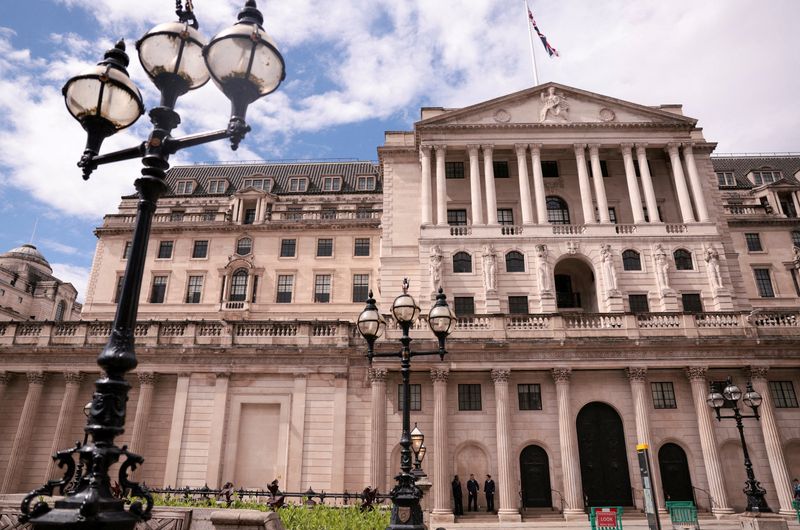By Mike Dolan
LONDON (Reuters) -First to hike, first to hit its inflation target - and the last to cut?
It may be unwise to read too much into volatile and marginal interest rate bets in financial markets, but right now that's how they sketch the Bank of England's (BoE) policy trajectory against its major economy peers.
The pound - enthused by an expected but decisive UK election result this month - is lapping up that rate sequence most of all. And that's perhaps one reason the BoE may be tempted to jump the market gun next month, even though there's still only a 50% chance of that baked into the money curve.
Sterling topped $1.30 for the first time in a year this week, hit a two-year high against the euro and notched a 16-year high against Japan's ailing yen. The BoE's own trade-weighted sterling index is at its highest since 2016's Brexit referendum - appreciating some 13% from the nadir of 2022's jarring government budget farce.
Might the sheer strength of the pound be enough to force its hand?
Debate on the extent of so-called "exchange rate pass-through" to inflation has raged for years - with many different opinions on what underlying conditions make it impactful.
The clear counter-point is that BoE's main problem right now is less about import prices or dollar-denominated energy than that it is about still-spiky domestic price inflation.
But in a split decision, the pound may nudge things along - not least if there's concern that UK financial conditions more broadly don't over-tighten at the wrong moment.
UK economic surprises are unusually positive right now, but global equivalents have turned sour at midyear and the exchange rate could well come into play if that presages a wider international slowdown.
FIRST IN, LAST OUT
Japan's peculiar cycle aside, the BoE was the first of the rest of G7 to start lifting borrowing costs into the post-pandemic inflation spike in late 2021 - hiking twice before the U.S. Federal Reserve started three months later and piling 5 percentage points onto a near zero policy rate in 20 months.
Although it remains irked by annual wage gains and services price growth in excess of 5%, the BoE has this year become the first of its peer group to hit its headline 2% inflation target - where it's been held for two months now.
And yet the jittery world of money markets still expect it to be the last of the six to execute its first cut - following not only the European Central Bank (ECB) and Canada in the G7, but the Swiss and Swedish central banks to boot.
Markets even reckon the ECB, Canada and Sweden will likely have cut a second time before Threadneedle Street will be ready to budge.
To be sure, the BoE may only lag the Fed by a day in September if it matches those rate bets. But, even then, there's still a marginal doubt in money markets that it pulls the trigger in two month's time, while futures are comfortable fully pricing a Fed move.
Why the caution, and does the UK really need to bookend both sides of the global cycle?
KNIFE EDGE
For decades, Britain was seen as an inflation outlier - due in part to instability in sterling and its effect on such an open economy, its poor productivity record and political control of interest rates until 1997.
BoE independence shifted the dial. But the UK's outsize exposure to the banking crash of 2008 and then the trade and investment disruption from Brexit pummeled the pound - even if that was likely masked in domestic prices by subdued global inflation more generally.
That all changed with the post-COVID global inflation surge - and UK annual price rises topped 11% at one point, higher than the peaks in other countries.
The government budget missteps of 2022 added fiscal risk perceptions and fears for joined-up thinking between Treasury and the central bank on inflation control - compounding as it did UK vulnerability to the Ukraine-related energy shock.
Some of that has been painfully repaired since, with this month's change of government seen by many overseas investors as a clean break.
Whether the BoE can breathe easier is now the question. For a start, public inflation expectations fell to their lowest this month since before the pandemic, possibly assuaging some BoE concerns about "persistence" in wage and services inflation.
Sterling's rally apart, the dissipation of that latest risk factor can be seen most clearly in UK government bond markets, where the 150 basis point yield premium on five-year gilts over German equivalents is a full percentage point lower than it was at the height of the 2022 budget blowout.
Yet on the flipside, if BoE concern shifts to the dangers of staying too tight for too long, then the sight of an inflation-adjusted "real" five-year gap with Germany at its highest in 20 years may be food for thought.
With the pound now comfortably feeding off that premium rather than balking at it, the BoE might view it as a window.
A month or two may not matter greatly in the wider scheme of things, of course.
But despite hesitant money market pricing, there are plenty of economists who still expect the BoE to beat the Fed to the punch - with the likes of Barclays and Deutsche Bank tipping a rate cut next month as the central bank uses new forecasts in its latest Monetary Policy Report to explain.

"August's Bank Rate call is on a knife-edge," said AXA Investment Managers' G7 economist Gabriella Dickens, adding she expects a 5-4 policymaker vote to cut.
The opinions expressed here are those of the author, a columnist for Reuters.
(By Mike Dolan X: @reutersMikeD; Editing by Jamie Freed)